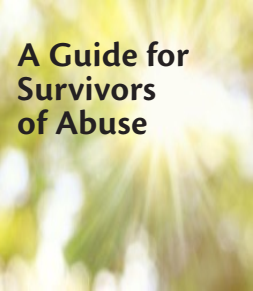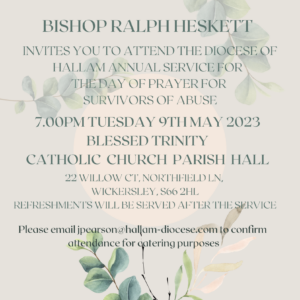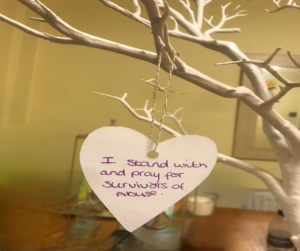Sorry doesn’t feel enough…
The very fact that you are reading this page, perhaps means you are seeking some support and our first words to you come from the heart — we are deeply sorry for the abuse that you have suffered, from the moment the abuse began, and for every day after that you have lived your life as a survivor. This section of our website is dedicated to providing information about how the Church can help support you, and our policies for responding to allegations of abuse. We appreciate that there are many barriers to feeling able to disclose abuse and gently encourage you to reach out to somebody so that your Journey of help and support can begin.
Our Commitment to Survivors Policy
Hallam Commitment To Survivors
The Diocese of Hallam engages the support of survivors of abuse to assist in the development of Policy and Practice, as well as with the production of literature for survivors as well as content for training and events. For anonymity purposes, the members are not listed. We are very grateful for the invaluable contribution that this provides and we thank all survivors, who support our development. There is no set meeting pattern or format to how this consultation takes place, as we understand the importance of survivors having the choice and autonomy to decide how best they would like to provide this support to us. All feedback remains anonymous and where advice may be sought on how to best support survivors, all information is anonymised and remains confidential in line with confidentiality agreements. We also work closely with Providers of Survivor Support, to inform our Policy and Practice. If you would like to consider joining this panel please contact Marie O'Donnelly, Safeguarding Coordinator on 07909117964, or by email at [email protected]
First of all, we are sorry that abuse is happening to you or has happened to you in the past. Please tell someone as soon as possible. What you say will be taken seriously and the Church has a zero tolerance approach to abuse of any kind. If you have any concerns about your immediate safety, you should contact the police on 999 or your local social services department. You can choose who you talk to within the Church, including the Safeguarding Co-ordinator, who is available by mobile on 07909 117964, or your own parish’s Local Safeguarding Representative. Alternatively, you may prefer to tell someone in the Church that you already know, such as a priest or a youth leader. They will make sure that you get help. They need to let one of the above people know if there is a child or adult protection matter to be dealt with. It is the policy of the Catholic Church to always inform statutory authorities (Police and Social Services) that abuse has been alleged. This is done in order to prevent further abuse from happening and to make sure that past abuse is properly dealt with. It is best not to let the abuser know you are going to talk to someone about the abuse as they may attempt to interfere. This could prevent you from getting help for yourself or helping to stop someone else being abused by the same person. You will be offered support and signposted to appropriate agencies who are available to support you. The below leaflet provides you with guidance and information about the formal processes that may take place once you have disclosed the abuse to us. A Guide for Survivors Of Abuse Local and National Support Agencies
Understandably, many people find it difficult to tell anyone about the abuse they have experienced. It may be many years after the event before a disclosure is made. Whenever you choose to tell, you will be listened to and what you have to say will be taken seriously. Your Local Safeguarding Team have a special responsibility to work to support those who disclose abuse, regardless of how much time has past since the abuse took place. Alternatively, you may prefer to tell someone in the Church that you already know such as a priest or a youth leader. Hopefully, they will make sure that you get help. They need to let one of the above people know that there was a child protection matter to be dealt with. If you have any concerns about the responses to anything you say about experiences of abuse, the Safeguarding Committee or Clergy Advisor would be glad to hear from you.
In the past there have been people who have been abused by Church personnel and who found the response of the Church to be inadequate, uncaring and having a devastating affect to their already painful experience of abuse. The Church is committed to a zero tolerance approach to abuse and in continuing to learn how to respond in a supportive and healing way, to the needs of those who have suffered abuse. The Diocese of Hallam has a policy for the support of those harmed by abuse because of their contact with the church. This policy embodies the pastoral responsibility of the Church towards those affected by abuse and seeks to ensure that the support needs of all those affected by abuse are effectively addressed. Here at the Hallam Diocese, we have a team of independent registered counsellors who are able to work with individuals on a vast number of issues, including for those who have experienced abuse. For more information please visit the Caritas - Counselling Section of the Diocesan Website which can be found on this link https://hallam-diocese.com/caritas/counselling/. Safe Spaces is also an independent organisation which provides support to those who have experienced church based abuse. For more information please visit the Safe Spaces section which can be found at https://hallam-diocese.com/safeguarding/hurt-by-abuse-2/ Further National and Local Support Organisations can be found Local and National Support Agencies
We aim to provide support to Survivors of abuse, that is compassionate, empathic, understanding and sensitive to the individual needs of each Survivor.
We recognise the invaluable contribution that survivors can make to help us improve and develop our practice and it is important that we are able to receive feedback from Survivors who we have worked to support in order to determine how well we are doing this and of any suggestions of actions that could improve our practice and we will provide feedback opportunities to all Survivors who we have contact with.
We respect that not all Survivors would wish to provide feedback to us, or that some Survivors wish to give feedback but anonymously. Feedback is entirely at the discretion of each Survivor and can be provided in a format to suit the individual. To submit feedback anonymously, please write to: The Diocese of Hallam Safeguarding Committee Chair at The Diocese of Hallam Pastoral Centre, St Charles Street, Attercliffe, Sheffield, S9 3WU.
We also seek to explore the valuable contribution of Survivors and Support Agencies who are not directly connected to the Church, in order that we are able to apply independent experiences and learning to our practice. You are invited to contact the Safeguarding Coordinator via [email protected] if you would be interested in supporting our improvement and development work.
A list of useful resources, books and websites.
Developing a better understanding of the impact of sexual abuse in childhood on adults.
The myths and stereotypes surrounding abuse.
The Goddard Inquiry into Child Sexual Abuse is now launched and a report will be expected by 2020. For further details about the Terms of Reference and how the Catholic Church will be involved, please link directly to the website at https://www.iicsa.org.uk/, which provides a very clear explanation of the enquiry and the processes surrounding it, especially the evidence gathering structures, and the victims and survivors consultative panel.
Please see link for developments with Goddard Inquiry announced on the 11th November 2015.
Consider the extent to which State and non-State institutions have failed in their duty of care to protect children from sexual abuse and exploitation; to consider the extent to which those failings have since been addressed; to identify further action needed to address any failings identified; to consider the steps which it is necessary for State and non-State institutions to take in order to protect children from such abuse in future; and to publish a report with recommendations.
• Consider all the information which is available from the various published and unpublished reviews, court cases, and investigations which have so far concluded;
• Consider the experience of survivors of child sexual abuse; providing opportunities for them to bear witness to the Inquiry, having regard to the need to provide appropriate support in doing so;
• Consider whether State and non-State institutions failed to identify such abuse and/or whether there was otherwise an inappropriate institutional response to allegations of child sexual abuse and/or whether there were ineffective child protection procedures in place;
• Advise on any further action needed to address any institutional protection gaps within current child protection systems on the basis of the findings and lessons learnt from this inquiry;
• Disclose, where appropriate and in line with security and data protection protocols, any documents which were considered as part of the inquiry;
• Liaise with ongoing inquiries, including those currently being conducted in Northern Ireland and Scotland, with a view to (a) ensuring that relevant information is shared, and (b) identifying any State or non-State institutions with child protection obligations that currently fall outside the scope of the present Inquiry and those being conducted in the devolved jurisdictions;
• Produce regular reports, and an interim report by the end of 2018; and
• Conduct the work of the Inquiry in transparent a manner as possible, consistent with the effective investigation of the matters falling within the terms of reference, and having regard to all the relevant duties of confidentiality.
A letter from the Catholic Bishops’ Conference of England and Wales and the Conference of Religious states “As a Church in these countries, we acknowledge our history in the arena of child sexual abuse; but we also have a compelling story to tell of how we have addressed these issues through our safeguarding reviews by Lord Nolan and Baroness Cumberledge and the ongoing work of the NCSC and CSAS.”
The Safeguarding Commission is aware that the enquiry may raise issues for many individuals within our communities. Anyone who has any queries or concerns can contact the safeguarding office on 0114 2566453.
The Isaiah Journey -Seeking Truth, Bringing Hope, Finding Healing
Inspired by the writing of the prophet Isaiah, it has three strands:
Seeking Truth
The prophet Isaiah describes himself as ‘A voice of one calling, ‘In the wilderness prepare the way of the Lord; make straight in the desert a highway for our God.’ (Isaiah 40:3)
This invites us on a journey to face the truth of the anguish of those who have been impacted by abuse. In listening to survivors, families and communities, we begin the work of ‘preparing a way’ for God’s healing and renewal through our repentance and desire to respond.
Bringing Hope
Isaiah gives the words which Jesus uses at the beginning of his earthly ministry:
Jesus stood up to read in the synagogue at Nazareth; the scroll of the prophet Isaiah was given to him, and he unrolled it and found the place where it was written:
‘The Spirit of the Lord is upon me, because he has anointed me to proclaim good news to the poor. He has sent me to proclaim liberty to the captives and recovering of sight to the blind, to set at liberty those who are oppressed, to proclaim the year of the Lord’s favour.’ (Luke 4:16-21 quoting Isaiah 61:1-2)
Jesus embodies the words of the prophet Isaiah and we, as baptised members of his Body, the Church, are called and anointed by the gift of the Holy Spirit to do the same.
Finding Healing
Isaiah writes that the Messiah (and by implication those who follow him) is a healer: ‘A bruised reed he will not break, and a faintly burning wick he will not quench; he will faithfully bring forth justice. He will not grow faint or be discouraged until he has established justice in the earth’. Isaiah 42:3-4
Many in the Church have been broken and their faith extinguished. Together as people of God, we seek to
acknowledge the immense harm that has been inflicted. We intend not to ‘grow faint or weary or be discouraged’, but with renewed trust, we believe in God’s power to bring healing and hope, to victims and survivors, families and communities and the wider church.
National Day of Prayer for Survivors of Abuse 9th May 2023
On 9th May 2023, the Hallam Diocese observes the National Day of Prayer for Survivors of Abuse. The Service has an open invitation for all to attend, in order to demonstrate support and understanding to all Survivors of Abuse and to acknowledge specifically, the harm that has been caused by abuse perpetrated by members of the Catholic Church. The service contains specially selected prayers and intersessions that have been prepared by the Isaiah Journey, and music which includes hymns and other appropriate songs that aid reflection. There are also 2 testimonies that have been written by Survivors of Abuse , that will be read at the service. The testimonies give a powerful insight to the ongoing challenges that are faced by Survivors of Abuse long after the abuse stops. It is important that the Church reflects on these experiences and learns from Survivors in order to effectively support all Survivors of abuse. The Diocese of Hallam is committed to working with Survivors in order to provide effective and trauma informed compassionate support. Survivors provide valuable support to the Diocese and help to inform our policy and practice. We are thankful to all Survivors who work with us to develop and improve our practice and who support events such as the National Day of Prayer for Survivors of Abuse.
The Isaiah Journey Resources can be used and adapted for use in Parishes at any time and can be found at the following website Isaiah Journey Resources for Day of Prayer for Survivors of Abuse 2023
Invitation Day Of Prayer for Survivors of Abuse

Order of Service, Testimonies and Music from the Service
Order of Service for Day of Prayer For Survivors of Abuse 2023
Please note that the layout for the order of service is in running order for viewing electronically. Print layout copies can be requested from the Safeguarding Office
Thanks are given to our Survivor 'F' who wrote and read their testimony at the service. Your contribution was incredibly powerful and moving in a way that words can not convey.
Psalm 121 Scriptural reflection by a Survivor
We also thank the Survivor who wrote this Spiritual Reflection to be read out at the service and for their honesty about how the Abuse Crisis in the Catholic Church has impacted their relationship with God and the Church.
We are thankful that the Priest in this testimony responded with such compassion and empathy and strive that all Survivors who make contact with the Church are responded to in a trauma informed and compassionate way. We have shared the Isaiah Journey Listening Guide Listening Guide with all who attended the service. This has also been circulated to our clergy and Parish Safeguarding Representatives as part of their ongoing development and training.
We also launched the Isaiah Journey 'Survivors Guide' at the Service and this is also to be made available in Churches and other Catholic Premises as part of our outreach to Survivors and to provide some information about what may happen when a disclosure of abuse is made. Special thanks are given to the Survivors who supported the development of this guide by working alongside the Diocese of Hallam Safeguarding Coordinator to create this Nationally available resource which also contains National Support Contacts Survivors Guide Local Support Contacts can also be found here Local and National Support Contacts
Song Lyrics for Closing Song - Bridge Over Troubled Water, Vocals and Harp performed by Sarah Dean
We thank also Sarah Dean who provided harp and vocal music for the service. Thank you for learning the hymn and closing song and for playing so beautifully as attendees arrived. Your music helped to create a peaceful and reflective space for the service and was appreciated by all who attended.
As part of the Service, attendees placed hanging hearts containing the message 'I stand with and pray for Survivors of Abuse' onto a prayer tree. The tree is being sent on a journey around Parishes so that its purpose can be explained at the end of mass and parishioners invited to continue to place hearts of support and prayers onto the tree as it travels around the Diocese. Parishes who wish to host the tree should contact the Safeguarding Office to make arrangements.

Tuesday, 17 May 2022 The Pontifical Commission for the Protection of Minors (PCPM) has highlighted the importance of prayer and suggested to Pope Francis that the worldwide Catholic Church should…Day Of Prayer for Survivor Of Abuse 2022
If you have any ideas for seminar topics you would find helpful or would like to have considered, please contact Jo Pearson, the Safeguarding Administrator, on 0114 256 6453 or by email to [email protected] .

